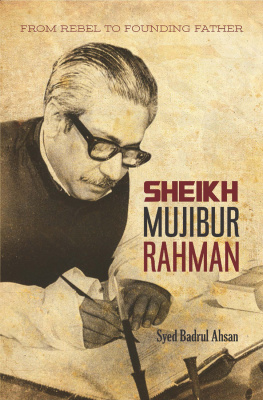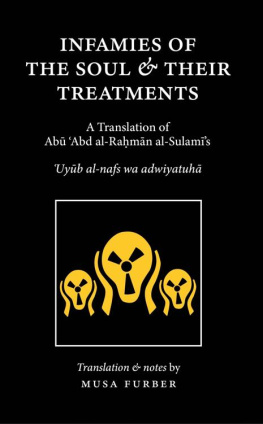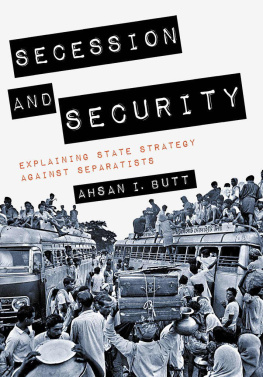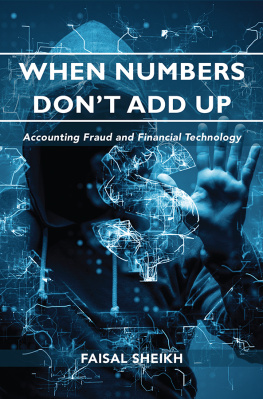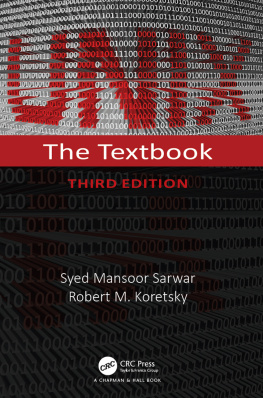Syed Badrul Ahsan - Sheikh Mujibur Rahman: From Rebel to Founding Father
Here you can read online Syed Badrul Ahsan - Sheikh Mujibur Rahman: From Rebel to Founding Father full text of the book (entire story) in english for free. Download pdf and epub, get meaning, cover and reviews about this ebook. year: 2014, publisher: Niyogi Books, genre: Politics. Description of the work, (preface) as well as reviews are available. Best literature library LitArk.com created for fans of good reading and offers a wide selection of genres:
Romance novel
Science fiction
Adventure
Detective
Science
History
Home and family
Prose
Art
Politics
Computer
Non-fiction
Religion
Business
Children
Humor
Choose a favorite category and find really read worthwhile books. Enjoy immersion in the world of imagination, feel the emotions of the characters or learn something new for yourself, make an fascinating discovery.
- Book:Sheikh Mujibur Rahman: From Rebel to Founding Father
- Author:
- Publisher:Niyogi Books
- Genre:
- Year:2014
- Rating:4 / 5
- Favourites:Add to favourites
- Your mark:
- 80
- 1
- 2
- 3
- 4
- 5
Sheikh Mujibur Rahman: From Rebel to Founding Father: summary, description and annotation
We offer to read an annotation, description, summary or preface (depends on what the author of the book "Sheikh Mujibur Rahman: From Rebel to Founding Father" wrote himself). If you haven't found the necessary information about the book — write in the comments, we will try to find it.
Sheikh Mujibur Rahman: From Rebel to Founding Father — read online for free the complete book (whole text) full work
Below is the text of the book, divided by pages. System saving the place of the last page read, allows you to conveniently read the book "Sheikh Mujibur Rahman: From Rebel to Founding Father" online for free, without having to search again every time where you left off. Put a bookmark, and you can go to the page where you finished reading at any time.
Font size:
Interval:
Bookmark:
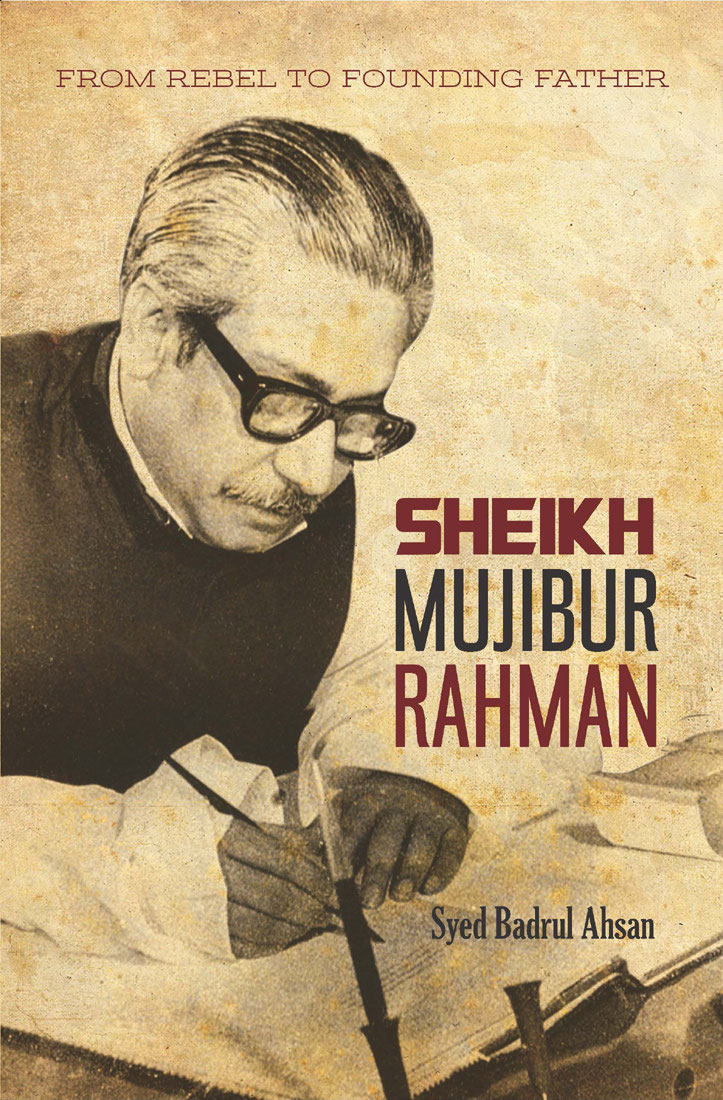


Jointly published by:

17 Aziz Market (G.F.), Shahbag, Dhaka 1000
204/B Tejgaon Link Road (3rd Floor), Gulshan,
Dhaka 1209
Tel: 88-02-9669555; 9662766, 9861003, 01713034440 or 01841234611
E-mail: pathak@bol-online.com
Website: www.pathakshamabesh.net

Block D, Building No. 77,
Okhla Industrial Area, Phase-I,
New Delhi-110 020, INDIA
Tel: 91-11-26816301, 26818960
Email: niyogibooks@gmail.com
Website: www.niyogibooksindia.com
Text Syed Badrul Ahsan
Photographs Father of the Nation Bangabandhu Sheikh Mujibur Rahman Memorial Trust
Editor: Jayalakshmi Sengupta
Cover Design: Shashi Bhushan Prasad
Layout: Sarojini Gosain
ISBN: 978-93-83098-10-1
Publication: 2014
Reprint: 2018
All rights are reserved. No part of this publication may be reproduced or transmitted in any form or by any means, electronic or mechanical, including photocopying, recording or by any information storage and retrieval system without prior written permission and consent of the Publisher.
Printed at: Niyogi Offset Pvt. Ltd., New Delhi, India

If there is one man to whom the emergence of the Peoples Republic of Bangladesh (1971) is indebted, whose contribution to history has made him a legend, it is Sheikh Mujibur Rahman. His patient endeavour and staunch belief in the rights of the Bengalis created a new milestone for them, giving them the opportunity to not only establish and uphold their cultural entity at last, but also the dignity to proclaim it on the world stage. The story of this great mans meteoric growth, and his equally tragic end, is part of Bengali folklore today, which continues to inspire millions of Bangladeshis across the globe.
Mujib was Bangabandhu, a friend of Bengal, an honorific a grateful nation bestowed on him in early 1969 after he was freed from incarceration in the Agartala Conspiracy case by the Pakistani military regime of Field Marshal Ayub Khan. He deserved the honour, for it was his dedication to the cause of Bengali autonomy within Pakistan and then independence from Pakistan that was to underline his political struggle, all the way to his assassination in August 1975.
A remarkable aspect of Bangabandhus political character was the steady and sure evolution of his personality from one steeped in the communal politics of the Muslim League in the 1940s, to that of a political being, ready not only to embrace but inaugurate a secular order for his people by the mid-1960s. His Six-Point Programme of regional autonomy for Pakistans federating units, as presented in early 1966, was the first clear sign of how he meant to steer politics towards a new frontier.
Mujibs significance in the politics of Pakistan and subsequently of Bangladesh came to be formally acknowledged when, for the first time in the history of a state carved out of British India in 1947, he emerged as the undisputed leader of the majority party at Pakistans first general elections in December 1970. Of course, the results of those elections were to be subverted by the military regime of General Yahya Khan in league with the machinations of the leader of the minority Pakistan Peoples Party, Zulfikar Ali Bhutto. The conspiracy snowballed into a crisis that engulfed Pakistan in March 1971, followed by the genocide launched by the Pakistan army against its Bengalis later that month. It convinced Bangabandhu in no uncertain terms that his people needed to find their own way out of Pakistan. His declaration of Bangladeshs independence in the early hours of 26 March 1971, followed by his arrest at the hands of the army and his subsequent solitary confinement and secret trial in West Pakistan, were events which galvanised Bengalis into a necessary spirit of liberation.
Sheikh Mujibur Rahman remains that rare instance of a statesman in history in whose name, and in whose physical absence, a nation fought its way to freedom. The surrender of Pakistan in Bangladesh in December 1971 was indeed the culmination of Mujibs long struggle for the emancipation of his people. That was when the legend around the man took shape. In the following three and a half years in which he governed his new nation, Bangabandhu was buffeted by problems of an unprecedented nature inasmuch as he was fortunate in propelling his country into the councils of the world. He asked his nation to give him three years to turn the country around. His enemies made sure he did not survive. They killed him, with most of his family, on 15 August 1975.
Bangabandhu Sheikh Mujibur Rahman remains in death, as he was in lifetime, Bangladeshs foremost political symbol. For people outside Bangladesh, and indeed for the generations that came to life and adulthood after his passing, it is important that his story, the record of his times, be presented in a dispassionate manner. Syed Badrul Ahsans work on the founder of Bangladesh, I am convinced, will do that job to the satisfaction of all.
A.F. SALAHUDDIN AHMED
National Professor
President, Managing Committee, Bangabandhu
Sheikh Mujibur Rahman Memorial Museum, Dhaka

My association with Sheikh Mujibur Rahman, Father of the Bengali Nation and Bangabandhu to his grateful people, began in early 1968 when I heard my father speaking in whispers with his colleagues about the charge of conspiracy laid at Mujibs door by the Pakistan government. My fathers conviction was absolute: Mujib, a believer in constitutional politics, was made of better stuff.
As the chief of the Awami League, he toured innumerable villages and towns in East Bengal, then known as East Pakistan, trying to impress on his people the belief that if democracy was the goal, and economic prosperity of the various regions of Pakistan was the overall national objective, the state of Pakistan would need to change. The change would necessarily have to be based on the Six Points he and his party offered to the country. The Six Points argued for a federal state where its constituent provinces would enjoy the highest degree of regional autonomy.
The Six Points were brushed aside despite the electoral triumph of the Awami League at Pakistans first general election in December 1970. What followed the collapse of the tripartite talks, involving the Awami League, the Pakistan Peoples Party and the Pakistan Army in March 1971, was horror. Once again, Sheikh Mujibur Rahman was a prisoner of the state intent on demonstrating its ferocity in East Bengal. In the nine months that followed, three million Bengalis died at the hands of the army and two hundred thousand Bengali women were raped by Pakistani soldiers. Eventually, in December 1971, the Mukti Bahini, in alliance with the Indian Army, rammed through Pakistans defence lines, to preside over the birth of a new, secular and democratic country.
Font size:
Interval:
Bookmark:
Similar books «Sheikh Mujibur Rahman: From Rebel to Founding Father»
Look at similar books to Sheikh Mujibur Rahman: From Rebel to Founding Father. We have selected literature similar in name and meaning in the hope of providing readers with more options to find new, interesting, not yet read works.
Discussion, reviews of the book Sheikh Mujibur Rahman: From Rebel to Founding Father and just readers' own opinions. Leave your comments, write what you think about the work, its meaning or the main characters. Specify what exactly you liked and what you didn't like, and why you think so.

